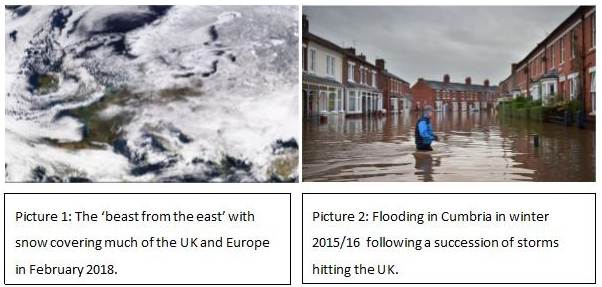Regime behaviour of Earth’s jet streams and role for recent extreme weather
- Academic lead
- Amanda Maycock (Earth and Environment)
- Industrial lead
- Steven Hardiman, UK Met Office
- Co-supervisor(s)
- Stephen Griffiths (Mathematics), Christine McKenna (Earth and Environment)
- Project themes
- Environmental Flows, Geophysical and Astrophysical Flows
Earth’s jet streams control many features of weather and climate in the extratropics including in the UK and Europe. Most winter weather extremes in these regions are driven by the jet stream. For example, the “Beast from the East” that brought severe wintry weather to the UK in February 2018 was associated with a disrupted jet stream causing cold polar air to penetrate over the UK and Europe (see picture 1). Recent research advances have revealed that the winter jet stream tends to occupy one of three preferred regimes. This regime behaviour affects the predictability of the jet stream and associated weather extremes and is therefore of interest to weather forecasters and end-users.

Both of these extreme winters were associated with regime-like behaviour of the North Atlantic jet stream.
This PhD project will use a combination of observations, simplified dynamical models, and state-of-the-art climate models to investigate the regime behaviour of the jet stream and its connections to weather and climate extremes. Depending on your interests, you will investigate the sensitivity of the jet stream to drivers including the tropics, the Arctic, the stratosphere, and more fundamental features such as topography and sea surface temperature patterns. The ideas developed from these underpinning investigations will be tested using operational seasonal forecasts produced by the Met Office. The student will undertake visits to the Met Office to interact with members of the seasonal-to-decadal prediction group and will have access to Met Office models and datasets to support the research.
The project would suit a candidate with a strong mathematical background and an interest in weather and climate. You will develop advanced programming and modelling skills, learn new statistical methods and gain an excellent knowledge of atmospheric dynamics. Full training in modelling and data analysis will be provided.
